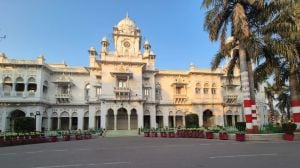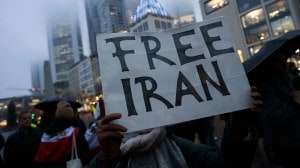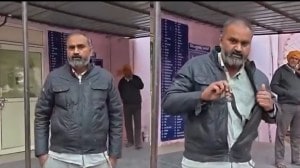Courage under fire
They are variously described as mavericks, oddballs, trouble makers and obstructionists. They insist on blowing the whistle every time the...

They are variously described as mavericks, oddballs, trouble makers and obstructionists. They insist on blowing the whistle every time they find people around them 8212; often their superiors 8212; with their hands in the public till. They seldom get rewarded for their rectitude. Instead, they are banished to obscure punishment postings or suspended on flimsy charges such as acting beyond their brief or speaking to the media without authorisation. The powerful people whose wrongdoings they expose get away unscathed.
The impression that good guys get rewarded and bad guys punished is perpetuated by newspaper headlines spotlighting the scandals. Members of Parliament raising questions in the House amidst unprecedented pandemonium followed by the inevitable inquiry committee and CBI probe is by now a familiar pattern. But when the dust has finally settled, nine times out of ten, the guilty walk away free. The system is designed to protect itself; the cardinal rule is that nobody shall rock the boat.
Bureaucrats have been indoctrinated to stonewall any effort to question the system. Their skill lies in successfully confusing the issue without being caught uttering an outright lie. In official written replies to MPs8217; questions in Parliament, they manage to give away nothing to the untutored questioner. For instance, if the question is 8220;Were specification benchmarks altered in the contract?8221; the reply could be a deadpan: 8220;The bidding procedure was approved by the World Bank8221;. Ordering an inquiry or a CBI probe is not a magical solution to rectify matters. Inquiries tend to end up at a dead end after years of investigation, be it Bofors or the hawala case.
This piece is a tribute to the spirit of the obstructionist maverick. But this genre should not to be confused with those whom the newspapers dub as crusaders. Crusaders pick and choose their causes very carefully, network cleverly with an eye on the main chance and a future career in public life. Which is why crusaders like T.N. Seshan and K.J. Alphonse usually manage to land on their feet.
The hallmark of the maverick is that he is a glutton for punishment because of his integrity and doggedness. Take the case of my friend, Arun Bhatia, a senior level Maharashtra cadre IAS officer. His career is in a shambles. He has to report to people much junior to him. While his contemporaries in service are comfortably posted in Delhi or Mumbai he and his family are constantly on the move, transferred from one backwater district to another.
Bhatia8217;s problem is that he has an unerring ability to sniff out a scandal and take measures to rectify it. In Dhule, he stopped government doles being diverted into the pockets of government employees. In Alibagh, he came into conflict with two of the town8217;s leading politicians over land misuse. In Mumbai, he unearthed the FSI floor space index racket by which builders and politicians in collusion with corrupt employees in the Mumbai collector8217;s office were altering the figures in the land records to inflate usable FSI. In Pune, he made waves by boldly demolishing 40 illegal structures owned by powerful vested interests and was transferred within months of his taking over as municipal commissioner. The courts on the basis of a PIL admonished the state government for acting vindictively and reinstated him. True to his creed, Bhatia refused to leave well alone and promptly submitted to the chief secretary a long list of officers whom he wanted suspended for their complicity in falsifying official records.Small wonder that Bhatia is once again out in the cold.
G.K. Khairnar, a middle-level official in the Mumbai Municipal Corporation, took on the city8217;s powerful land mafia and was suspended for eight years. V.P. Garg, a superintendent of Tihar jail was rewarded with 15 years suspension for attempting to reform the jail where undertrials were used as domestic help by jail officials, supplies meant for the prisoners diverted to private pockets and prisoners permitted to sodomise young boys.
Recently, I encountered yet another of this breed, Sadarchari Singh Tomar, assistant director general ARIS-computer information system engineering system from the Indian Council of Agricultural Research. The earnest Tomar came to me with piles of documentation exposing corruption worth crores of rupees in the purchase of the computer network system from a multinational. My first reaction was to gently refer him elsewhere. But his obvious sincerity and refusal to be dissuaded by my cavalier attitude shamed me into delving deeper into the voluminous material.
The damning evidence against the top brass of the IARI is clear. But once again the system has moved in to protect itself. In the light of Tomar8217;s constant file notings and objections, his superiors simply disassociated him from the reviewing procedure and distribution of the computer network, the very job he was appointed for. His personal assistant and lower division clerk were withdrawn, along with the four scientists and 15 members of the technical staff deputed to work under him.
Tomar has been awarded the President8217;s medal twice for his research papers and the Jawaharlal Nehru award for the best Ph.D. thesis in engineering and technology. But his department now questions his scientific credentials. His annual assessment reports have been blotted with remarks like 8220;suspicious of everything in official matters8221; and 8220;below average competence8221;. Amazingly, extracts from these supposedly confidential reports were handed to me in an effort to undermine Tomar8217;s fight against departmental corruption.
Tomar8217;s bio-data reveals that he is a habitual whistle-blower. Years ago, while on deputation to the Madhya Pradesh government8217;s agriculture department, he insisted on trying to physically verify whether Rs 50 crore worth of biogas plants had actually been installed in remote areas like Bastar and Chindwara. Harsh terrain, dense forests and kachcha roads did not prevent him from undertaking a physical check. It soon emerged that a sizeable percentage of the plants existed only on paper. The issue created a furore in the state assembly, but till date nobody has been penalised. The mild mannered scientist had to purchase a revolver because of the threats he received from his senior, a favourite of the then chief minister.
Why does Tomar go on exposing corruption when nobody else seems to care and when it keeps landing him into trouble? 8220;My system doesn8217;t permit me to look the other way,8221; is his extraordinarily simple explanation. The marvel is that we continue to come across such courageous people whose spirit is not crushed despite trying to take on the system practically single handed.
This is a tribute to the spirit of the obstructionist maverick. The hallmark of the maverick is that he is a glutton for punishment because of his integrity
- 01
- 02
- 03
- 04
- 05































